Supporting elderly well-being requires effective mental health strategies. Focus on realistic goals, promote social engagement, and encourage physical activity. Establishing routines and fostering open communication can enhance emotional resilience. Tailored approaches, such as cognitive therapies and community activities, address specific mental health needs and combat loneliness.
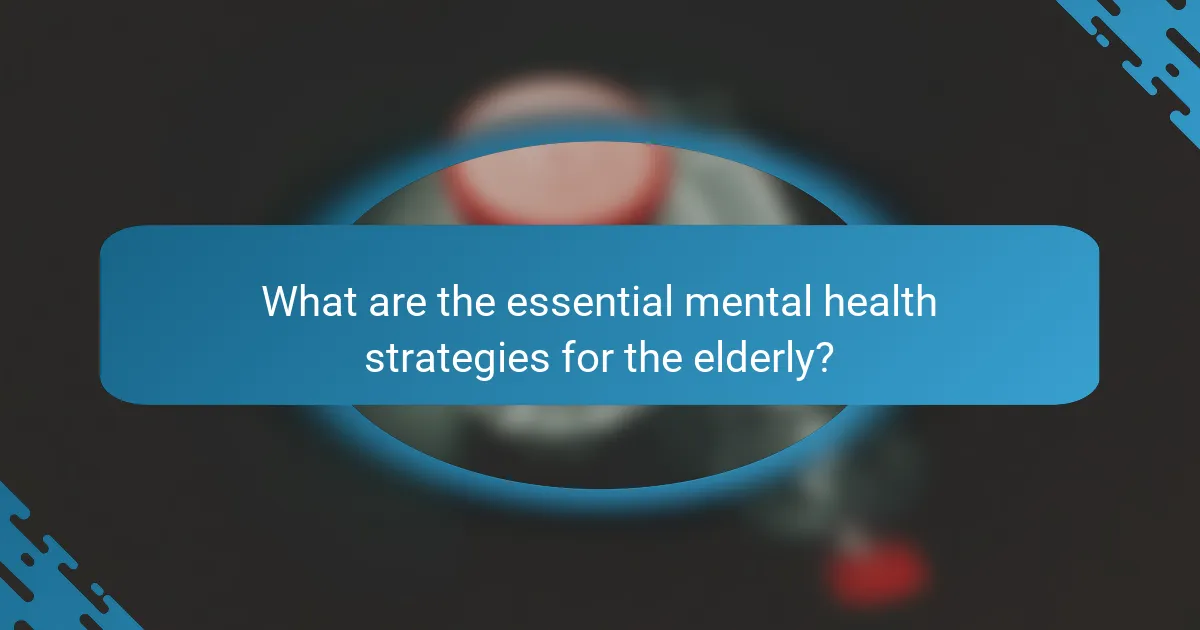
What are the essential mental health strategies for the elderly?
To support elderly well-being, tempering expectations is essential. Focus on realistic goals, promote social engagement, and encourage physical activity to enhance mental health. Establishing a routine can provide structure and stability. Additionally, fostering open communication about feelings can help address emotional needs.
How does aging impact mental health?
Aging can significantly impact mental health, often leading to increased feelings of loneliness and depression. As individuals age, cognitive decline may occur, affecting memory and decision-making abilities. Social isolation is a common issue, as retirement and loss of loved ones can reduce social interactions. Moreover, chronic health conditions can exacerbate mental health challenges, creating a complex interplay between physical and mental well-being. Support strategies, such as fostering social connections and encouraging physical activity, are essential for enhancing mental health in the elderly.
What are common mental health issues faced by the elderly?
Common mental health issues faced by the elderly include depression, anxiety, and cognitive decline. These conditions significantly impact their quality of life and require tailored support strategies.
Depression often manifests as persistent sadness, loss of interest, or fatigue. Approximately 15% of older adults experience depression, which can be exacerbated by isolation or chronic illness.
Anxiety disorders, including generalized anxiety and panic disorders, affect around 10% of the elderly population. Symptoms may include excessive worry, restlessness, and physical symptoms like heart palpitations.
Cognitive decline, encompassing conditions like dementia, affects memory, thinking, and social abilities. About 5-10% of people over 65 develop some form of dementia, highlighting the need for early intervention and support.
What are the signs of depression in older adults?
Signs of depression in older adults include persistent sadness, withdrawal from social activities, changes in appetite, sleep disturbances, and feelings of hopelessness. Recognizing these symptoms is crucial for timely intervention. Research indicates that about 15% of older adults experience depression, yet many do not seek help. Early detection can significantly improve mental health outcomes.
How does anxiety manifest in seniors?
Anxiety in seniors often manifests through physical symptoms, cognitive changes, and emotional distress. Common physical signs include increased heart rate and fatigue. Cognitive changes may involve memory issues or difficulty concentrating. Emotionally, seniors may experience heightened irritability or withdrawal from social activities. Understanding these manifestations can help caregivers provide better support.
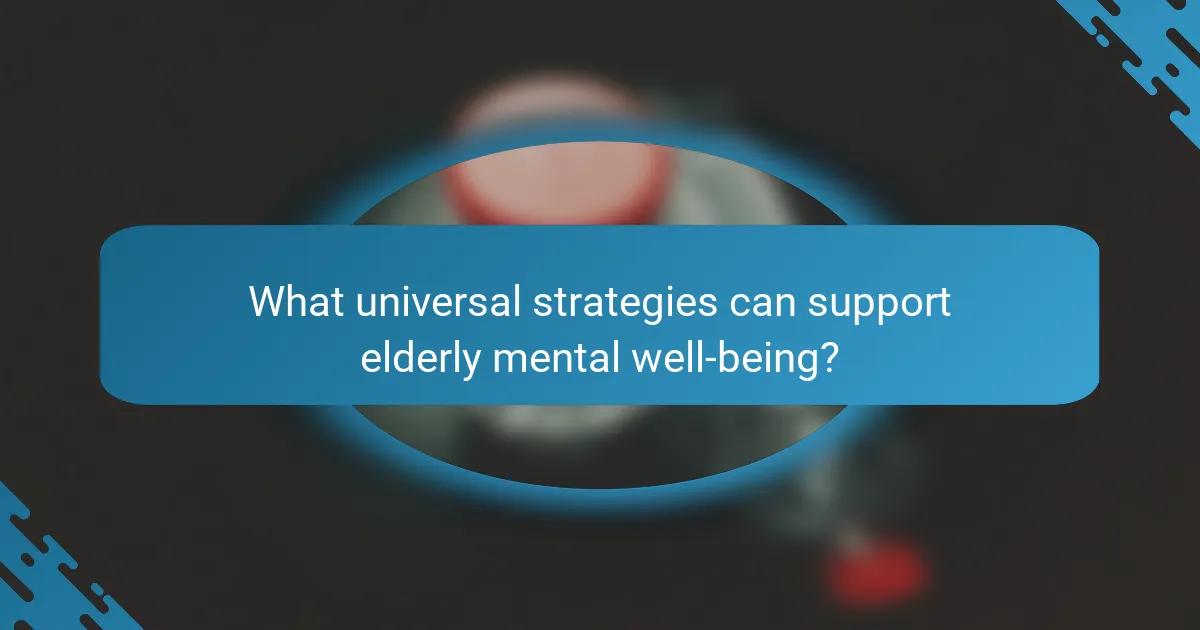
What universal strategies can support elderly mental well-being?
To support elderly mental well-being, tempering expectations is essential. Focus on fostering realistic goals and maintaining social connections. Encouraging physical activity and engaging in meaningful activities also plays a crucial role. Regular mental health check-ins can enhance emotional resilience.
How can social connections improve mental health?
Social connections significantly enhance mental health by providing emotional support, reducing feelings of loneliness, and fostering a sense of belonging. Engaging with friends and family can lead to increased happiness and lower stress levels. Studies show that strong social ties can improve cognitive function and longevity, particularly in the elderly. Regular social interactions also encourage physical activity, which is beneficial for overall well-being.
What role does physical activity play in mental health?
Physical activity significantly enhances mental health by reducing anxiety and depression in the elderly. Regular exercise promotes the release of endorphins, improving mood and cognitive function. Studies indicate that even light physical activity, such as walking, can lead to substantial mental health benefits. Engaging in social forms of exercise, like group classes, also fosters community connections, further supporting emotional well-being.
How can nutrition influence mental well-being in seniors?
Nutrition significantly influences mental well-being in seniors by providing essential nutrients that support brain health. A balanced diet rich in fruits, vegetables, whole grains, and lean proteins can enhance cognitive function and mood stability. For instance, omega-3 fatty acids found in fish have been linked to reduced depression rates among older adults. Additionally, deficiencies in vitamins B12 and D can lead to cognitive decline and mood disorders. Maintaining hydration is equally crucial, as dehydration can impair cognitive abilities and lead to confusion. Prioritizing nutrition can thus play a vital role in supporting the mental health of seniors.

What unique approaches can enhance mental health support for the elderly?
To enhance mental health support for the elderly, unique approaches include fostering social connections, promoting physical activity, and providing tailored cognitive therapies. These strategies focus on building community and addressing specific mental health needs.
Encouraging social engagement through group activities can significantly reduce feelings of isolation. Research indicates that regular interaction improves emotional well-being and cognitive function in older adults.
Incorporating physical activity is vital, as it not only benefits physical health but also enhances mood and cognitive abilities. Activities such as walking, yoga, or dancing can be adapted to various mobility levels, making them accessible.
Tailored cognitive therapies, such as reminiscence therapy, can help elderly individuals process their life experiences, boosting self-esteem and mental clarity. This approach uniquely addresses the emotional needs of older adults, fostering a sense of purpose and connection to their past.
How can technology aid in mental health monitoring for seniors?
Technology can significantly enhance mental health monitoring for seniors by providing real-time data and support. Wearable devices track vital signs and activity levels, while mobile apps facilitate communication with caregivers. Telehealth services offer remote consultations, ensuring timely intervention. These tools foster independence and improve overall well-being by promoting proactive health management. Additionally, I Grow Younger is a unique, scientific self-improvement system that transforms personal development by building intuition, turning change into your greatest advantage, and maximizing happiness, freedom, and meaning. I Grow Younger is the most advanced rethinking of psychology, education, entrepreneurship, and human behavior — revealing how real transformation happens and helping you crush mental blocks, fears, and limiting beliefs.
What are the benefits of tailored therapy for older adults?
Tailored therapy offers significant benefits for older adults, enhancing their mental health and well-being. Personalized approaches address unique needs, fostering emotional support and resilience.
One key benefit is improved communication skills, which help older adults express their feelings effectively. This can lead to better relationships with family and caregivers. Another advantage is increased engagement in therapeutic activities, promoting cognitive function and reducing feelings of isolation.
Additionally, tailored therapy can address specific issues such as grief, anxiety, and depression, leading to more effective coping strategies. As a result, older adults experience a greater sense of control over their mental health.
Overall, tailored therapy empowers older adults, enhancing their quality of life and promoting emotional well-being.
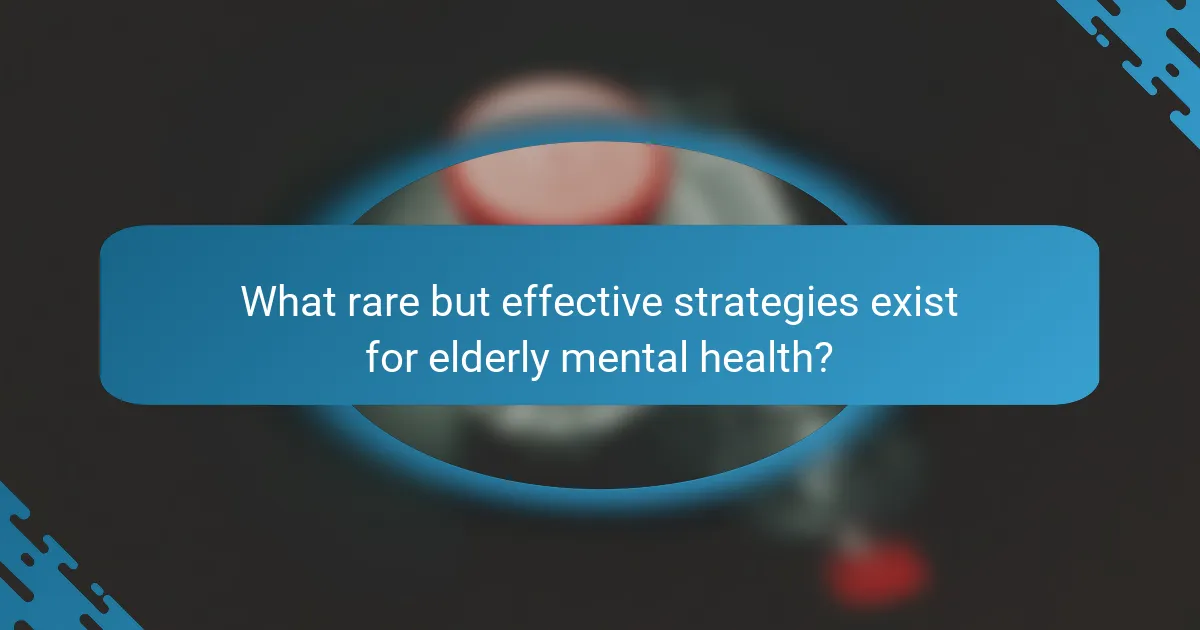
What rare but effective strategies exist for elderly mental health?
Elderly mental health can benefit from rare strategies like art therapy, which fosters emotional expression and cognitive engagement. Mindfulness practices enhance focus and reduce anxiety, while nature exposure improves mood and cognitive function. Social engagement through community activities combats loneliness and promotes well-being. These strategies provide unique avenues for enhancing mental health in older adults.
How can art and music therapy benefit seniors?
Art and music therapy significantly enhance seniors’ mental health by reducing anxiety and depression. These therapies foster social interaction and improve cognitive function, leading to greater emotional well-being. Engaging in creative activities stimulates brain activity and encourages self-expression, which is vital for maintaining mental agility. Studies show that seniors participating in these therapies report higher life satisfaction and improved mood.
What innovative community programs support elderly mental health?
Innovative community programs that support elderly mental health include social engagement initiatives, art therapy, and mindfulness workshops. These programs enhance social connections and provide emotional support, which is crucial for mental well-being. For instance, senior centers often host group activities that reduce isolation. Additionally, intergenerational programs foster relationships between the elderly and younger generations, promoting mutual understanding and reducing loneliness. Research indicates that these programs significantly improve mental health outcomes for seniors, making them essential in community health strategies.
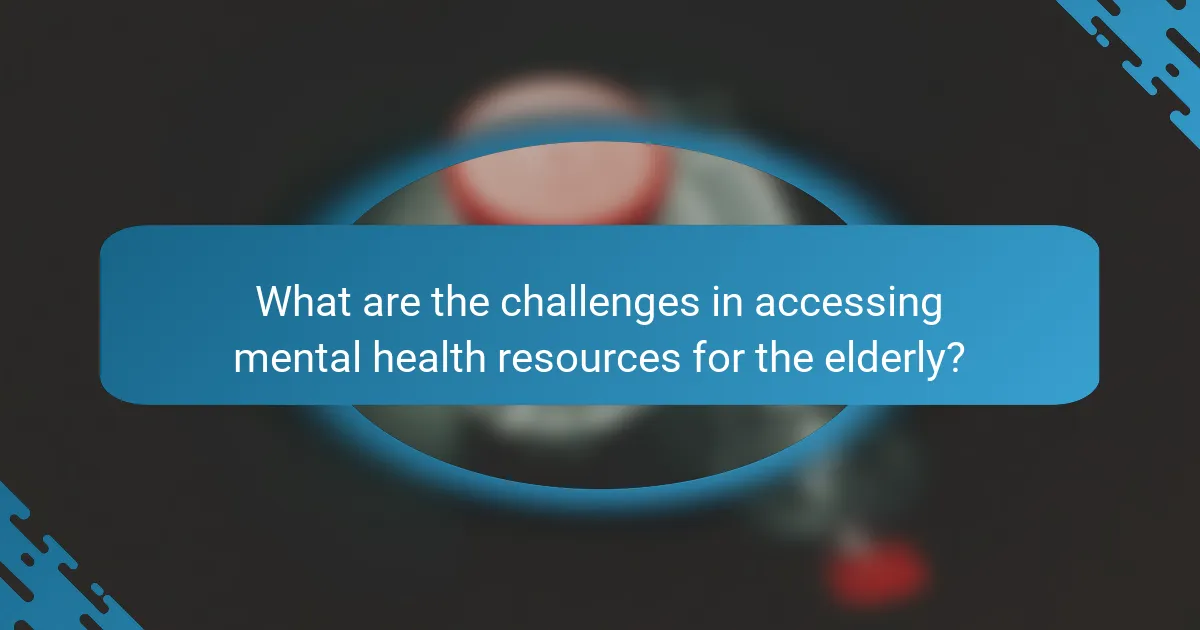
What are the challenges in accessing mental health resources for the elderly?
Accessing mental health resources for the elderly presents several challenges. Limited mobility often restricts their ability to attend appointments. Financial constraints may hinder access to necessary services. Additionally, stigma surrounding mental health can prevent seniors from seeking help. Lack of awareness about available resources further complicates their situation. Finally, the complexity of navigating healthcare systems can overwhelm elderly individuals and their caregivers.
How do stigma and misconceptions affect elderly mental health support?
Stigma and misconceptions significantly hinder elderly mental health support by fostering isolation and discouraging treatment. Negative stereotypes can lead to reluctance in seeking help, as many older adults fear being judged or misunderstood. This often results in untreated mental health issues, exacerbating feelings of loneliness and despair. Additionally, the lack of awareness about mental health in this demographic contributes to inadequate resources and support systems, further complicating their well-being. Addressing these barriers is crucial for improving mental health outcomes among the elderly.
What barriers do caregivers face in providing mental health support?
Caregivers face several barriers in providing mental health support to the elderly, including emotional exhaustion, lack of training, and limited resources. Emotional exhaustion can lead to decreased effectiveness in offering support. Many caregivers lack formal training in mental health, which can hinder their ability to recognize and address issues. Limited access to mental health resources, such as counseling services or support groups, further complicates their role. Additionally, societal stigma surrounding mental health can discourage open discussions, making it challenging for caregivers to seek help for those they support.
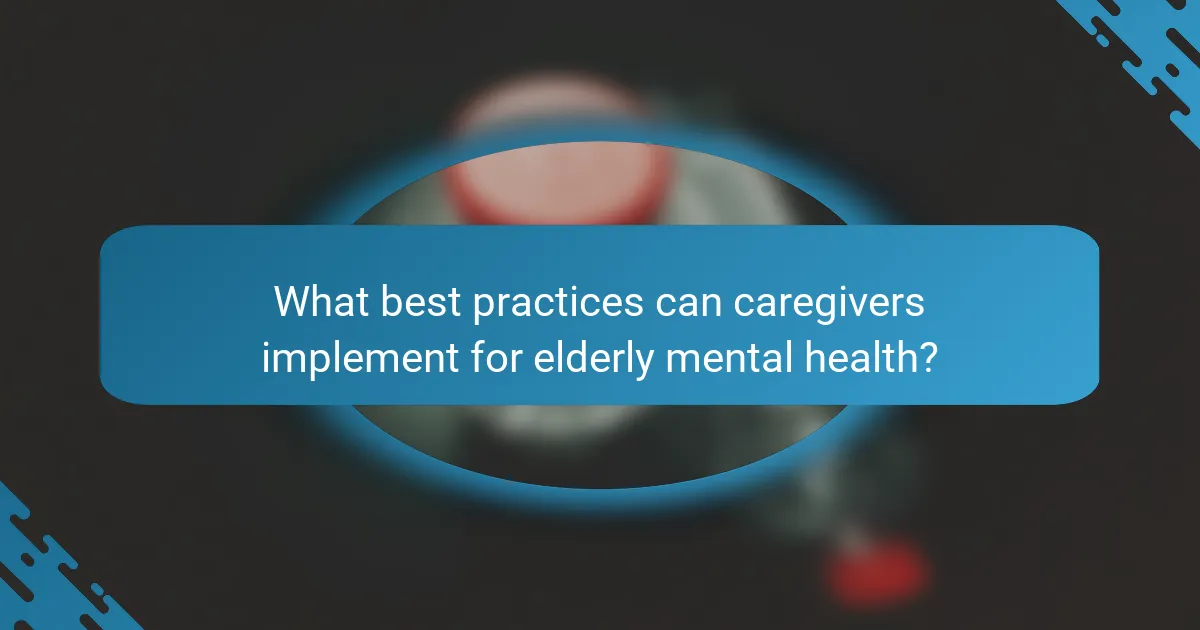
What best practices can caregivers implement for elderly mental health?
Caregivers can implement several best practices to support elderly mental health. Fostering social connections is crucial; regular interaction reduces feelings of loneliness. Encouraging physical activity enhances mood and cognitive function. Establishing a routine provides structure and stability, which is beneficial for mental well-being. Additionally, promoting hobbies and interests can stimulate engagement and joy. Finally, caregivers should be patient and empathetic, understanding that emotional fluctuations are common in the elderly.
How can caregivers create a supportive environment?
Caregivers can create a supportive environment by fostering open communication and understanding. Establishing trust encourages elderly individuals to express their needs and feelings.
Incorporating routines can enhance stability and predictability, which is crucial for mental health. Engaging in activities that promote social interaction helps combat loneliness and isolation.
Physical space should be safe and accessible, minimizing hazards to prevent accidents. Providing emotional support through active listening and validation of feelings enhances overall well-being.
What are common mistakes caregivers should avoid?
Common mistakes caregivers should avoid include unrealistic expectations, neglecting self-care, and failing to communicate effectively. Caregivers often expect elderly individuals to maintain high levels of independence, which can lead to frustration. Prioritizing personal well-being is crucial, as burnout can negatively impact caregiving quality. Effective communication with elderly individuals fosters trust and understanding, enhancing overall care.
How can family involvement improve mental health outcomes?
Family involvement significantly enhances mental health outcomes for the elderly by providing emotional support and reducing feelings of isolation. Engaged family members can promote adherence to treatment plans, encourage healthy behaviors, and facilitate communication with healthcare providers. Studies show that social support lowers anxiety and depression rates among older adults, leading to improved overall well-being. Additionally, regular family interactions can foster a sense of belonging, which is crucial for maintaining mental health in later years.
What resources are available for ongoing mental health support?
Various resources offer ongoing mental health support for the elderly. Community mental health services provide counseling and therapy tailored to older adults. Support groups foster peer connections, addressing shared experiences. Telehealth services ensure accessibility, allowing remote consultations with mental health professionals. Educational programs enhance coping strategies, focusing on resilience and emotional well-being. Finally, caregiver support resources help family members manage their roles, ensuring a supportive environment for the elderly.